Achievements and Announcements
ACHIEVEMENTS
- Vice Chancellor recognised for leadership excellence by Dublin university
- Future Fellows to advance environmental and biological solutions
- UniSA students rewarded for innovative research plans
- Alumna wins prestigious arts fellowship
ANNOUNCEMENTS
- Capture UniSA research in a visual form to win
- Anthony Elliott appointed Visiting Professor at University of Paris II
- Calling all STEM superstars
- New MOD. podcast explores wellbeing and connectedness in an age of disruption
APPOINTMENTS
ACHIEVEMENTS
Vice Chancellor recognised for leadership excellence by Dublin university
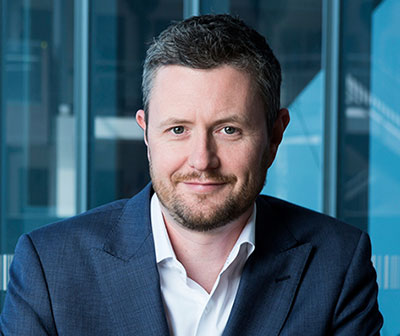
Dublin City University has recognised UniSA Vice Chancellor Professor David Lloyd for excellence in leadership.
Dublin City University (DCU) honoured the outstanding contributions of its alumni community in a virtual event in July at which Prof Lloyd received one of six Outstanding Achievements Awards. Prof Lloyd qualified with a Bachelor of Science (Honours) in Applied Chemistry and a PhD in Medicinal Organic Chemistry from DCU.
The awards honour alumni who, through their exceptional ability and leadership, have achieved excellence in their chosen fields of endeavour.
DCU President Professor Brian MacCraith says the awards highlight the huge impact its alumni have had around the world over the past four decades.
“Through their achievements, this year’s recipients of our Outstanding Achievement Awards exemplify DCU’s commitment to excellence and our mission to ‘transform lives and societies’,” he says.
Prof Lloyd received the Outstanding Achievement Award for Leadership.
Prof Lloyd is recognised as a leader of international standing in higher education. Having served previously as Dean and Vice President of Research and then as Bursar and Director of Strategic Innovation at Trinity College Dublin, he was appointed to his current role in 2012 as Australia’s youngest ever university Vice Chancellor. Prof Lloyd has refocused institutional culture to position UniSA as Australia's university of enterprise. Today UniSA is ranked 25 in the THE World’s Young Universities rankings and 29 in the QS Top 50 Under 50.
Prof Lloyd served on the South Australia Economic Development Board (EDB) from 2014 to 2018 and in 2019 was appointed Chair of the Committee for Adelaide, a group dedicated to supporting a progressive and sustainable future for South Australia.
He is a member of the board of Australia’s peak tertiary sector body, Universities Australia, and serves on the Australian Research Council (ARC) Advisory Council, advising on research and innovation policy.
Future Fellows to advance environmental and biological solutions
Support of more than $1.5 million has been awarded to two new Future Fellows at UniSA to progress research in nanomaterial surface structures for applications in health and environmental contexts, and the development of intelligent photonic sensors for applications across the energy and manufacturing sector.
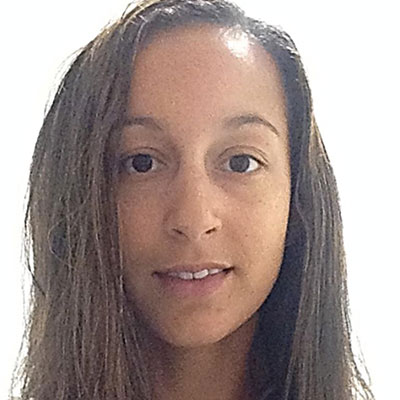
Drs Melanie MacGregor and Stephen Warren-Smith have been named Australian Research Council Future Fellows in the 2020 round of funding.
In a project to discover and map how nano-objects adsorb or stick to larger surfaces but with features of comparable size, Dr MacGregor hopes to make discoveries that will benefit industries from manufacturing and energy production to biology and biomaterials.
Funding of more than $790,000 will support the development of more reliable nanoengineered biosensors and biomarkers for the health and medical sector and improve the sustainability and efficiency of the energy industry through a greater understanding of surface interactions at the nanoscale.
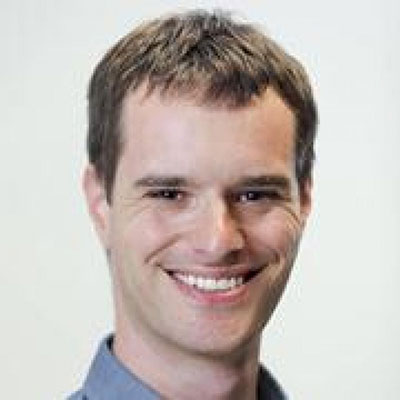
With the commencement of his Future Fellowship, Dr Stephen Warren-Smith will take up a position at UniSA’s Future Industries Institute to develop the next frontier in photonic waveguide sensing where machine learning will play an important role in transforming conventional photonic waveguide systems.
The almost $780,000 research project will employ machine learning to develop new photonic sensing systems able to measure and monitor extreme temperatures in harsh industrial settings such as power plants and smelters to contribute to greater safety and energy efficiency.
Congratulating the new Future Fellows, UniSA Deputy Vice Chancellor Professor Marnie Hughes-Warrington says the successful applications are an indication of the excellence of their research and its responsiveness to industry challenges.
“The work both Melanie and Stephen will spearhead will have a significant industry impact and contribute to our goals for more sustainable and healthy societies.”
UniSA students rewarded for innovative research plans
Seven UniSA Honours students are among the high-achieving recipients to receive a Playford Memorial Trust Scholarship in 2020.
The scholarship is intended to encourage outstanding students in science, technology, engineering and mathematics (STEM) studies and advance South Australia’s skills and research base.
Two UniSA students were awarded the Playford Trust Honours Scholarship:
- Brent Hennekam, Bachelor of Engineering (Honours) (Civil), is aspiring to work in the water engineering industry, hoping to help reduce the current stress on freshwater supplies.
- Brandon Turner, Bachelor of Science (Honours), will be researching frog populations in Adelaide, and the correlation between water salinity and the prevalence of a fungus that is extremely harmful to global frog populations (chytrid fungus).
The winner of the Codan/Playford Trust Scholarship was Mark Duffield, Bachelor of Engineering (Honours) (Electrical and Mechatronic), who is using existing artificial intelligence techniques to create a system that is capable of annotating datasets to facilitate machine learning for object identification in the infrared spectrum.
The winner of the Fay Fuller Foundation/Playford Trust Honours Scholarship in Health Sciences was Abbey Wehrmann, Bachelor of Clinical Exercise Physiology (Honours), who aspires to provide health education, exercise counselling and physical rehabilitation services for rural communities. Growing up in a small town, she has witnessed the devastating effects of mental health in rural communities because of a lack of services, and wants to make meaningful change.
The winner of the Nyrstar/Playford Trust Scholarship was Joshua Davis, Bachelor of Engineering (Honours) (Mechatronic), who hopes to gain a PhD in mechatronics, focusing on teaching and research. Joshua has previously travelled to his home town of Murray Bridge to mentor future students on transitioning into university through UniSA’s Rural Reconnect Scholarship.
The winner of the Aurecon/Playford Trust Women in Engineering Scholarship was Wendy Beeston, Bachelor of Engineering (Honours) (Electrical and Mechatronic), who will be working to adapt an existing machine to use automated collation and unloading of parts. The project aims to improve operator safety, while maintaining overall equipment performance.
The winner of the Playford Regional Science and Engineering Scholarship was Curtis Kleinig, Bachelor of Engineering (Honours) (Electrical and Electronic), who aspires to work in the renewable energy or defence sectors. He is currently undertaking an additional business degree so that he can take on management positions in the future.
Each year, the Playford Memorial Trust provides close to $500,000 in scholarships, internships and awards to university and TAFE students.
Alumna wins prestigious arts fellowship
A UniSA PhD graduate has been one awarded one of South Australia’s most prestigious and valuable fellowships – the Guildhouse Fellowship.
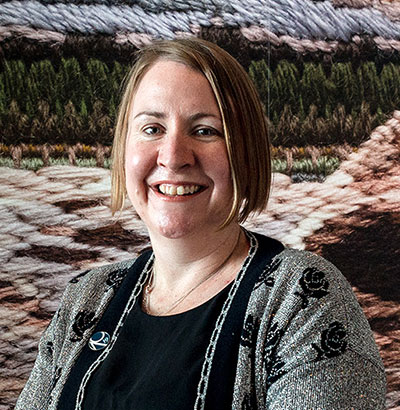 Dr Sera Waters with her work Falling: Line by Line, 2018 for the Ramsay Art Prize Photograph by Nat Rogers.
Dr Sera Waters with her work Falling: Line by Line, 2018 for the Ramsay Art Prize Photograph by Nat Rogers.Dr Sera Waters has been named the 2020 Guildhouse Fellow. Valued at more than $50,000, the Guildhouse Fellowship was inaugurated in 2019 with support from the Art Gallery of South Australia and the James & Diana Ramsay Foundation. The coveted prize is awarded to a mid-career visual artist, craftsperson or designer who has moved beyond the early years of their practice and who has a distinct artistic expression and seeks an expansive opportunity to explore, research and create.
Dr Waters is a prolific Adelaide-based artist working primarily with textiles and needlework to explore, understand and disrupt the colonial history of domestic homemaking practices. Over the course of her developing career, she has contributed to a diverse range of exhibitions and publications, including participation in local and international shows. In 2019 she was shortlisted for the Art Gallery of South Australia’s Ramsay Art Prize for Falling: Line by Line, a seven-metre long-stitch piece that depicts a fallen tree set against a sunset landscape.
Dr Waters’ recent work explores twin themes of colonisation and climate change, and she describes her own work as “underpinned by an ethics of care, a push for truth-telling, taking responsibility and listening”.
She received her Bachelor of Visual Arts (First Class Honours) in 2000, and her PhD in Visual Arts in 2018, both from the South Australian School of Art at UniSA.
ANNOUNCEMENTS
Capture UniSA research in a visual form to win
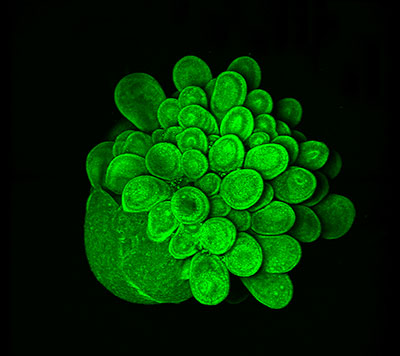 Last year’s winner A blooming mini-brain by Oksdath Mansilla
Last year’s winner A blooming mini-brain by Oksdath MansillaUniSA staff and students are being encouraged to capture images of the University’s world-class research for the sixth annual Images of Research competition.
Deputy Vice Chancellor for Research and Enterprise Professor Marnie Hughes-Warrington says the 2020 Images of Research and Enterprise Competition provides staff and students a great opportunity to showcase their unstoppable research.
“The competition highlights and rewards the creativity of our research and provides a unique opportunity for communicating this to our community, partners and alumni,” Prof Hughes-Warrington says.
For the past five years, the diversity and breadth of UniSA research has been captured by an increasing pool of captivating and illuminating images. This year, UniSA is encouraging participants to push artistic boundaries to highlight the compelling and diverse range of research at the University.
This year’s prizes include $5000 for first place and a People's Choice prize of $1000.
The competition closes on 30 September. For more information including terms and conditions, please visit the Images of Research website.
For UniSA staff, prize money will be transferred to a Professional Development (PD) fund to be used in accordance with UniSA’s Professional Development Fund Guidelines.
Anthony Elliott appointed Visiting Professor at University of Paris II
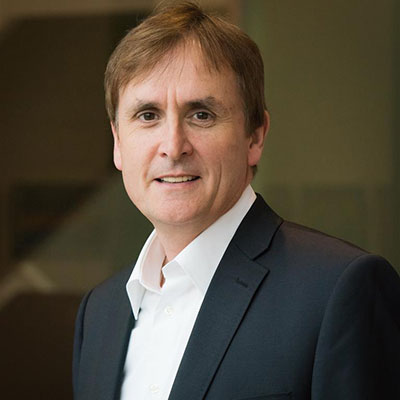
Building on UniSA’s engagement with the University of Paris II Panthéon-Assas, Dean of External Engagement and Executive Director of the Hawke EU Jean Monet Centre for Excellence and Network, Professor Anthony Elliott, has been appointed a Visiting Professor at Paris II.
The appointment for the academic year 2020-21 will see Prof Elliott working in collaboration with Professor of Political Science Jean-Jacques Roche and contributing to the Higher Institute of Armament and Defense Laboratory as well as Paris II’s Masters Program in Defense and Industrial Dynamics.
Sharing his expertise on the sociological impacts of Industry 4.0 and the coming tide of artificial intelligence, Prof Elliott will engage with students and researchers and deliver several lectures on the topic: Artificial Intelligence and the Future World Order.
While travel has been restricted because of the impact of COVID-19, UniSA has in recent years offered short term exchanges and related programs with University Paris II and is strengthening its international research collaboration with the university, focusing on international relations as well as the defence and space sectors.
Prof Elliott says that despite all the barriers the pandemic has raised across the globe, significant international academic collaborations are still thriving, and while he hopes to be able to travel to France sometime next year – technologies are already allowing significant engagement.
Calling all STEM superstars
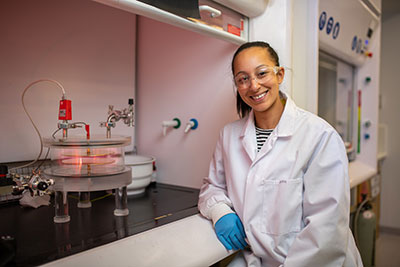 Dr Melanie MacGregor was named a Superstar of STEM in 2018. Photo by Juan Van Staden
Dr Melanie MacGregor was named a Superstar of STEM in 2018. Photo by Juan Van StadenA nationwide search for Australia’s next 60 Superstars of STEM was launched this month so, if you are working just across the benchtop or down the hallway from an inspiring female researcher or teacher in STEM, or a woman who uses STEM skills every day, why not encourage them to nominate?
The aim of the Superstars of STEM program is to build contemporary role models for women in science and ensure there are more of them.
Deputy Vice Chancellor Research and Enterprise at UniSA Professor Marnie Hughes-Warrington says role models have a huge impact on what people expect and can imagine.
“It is much easier to see your future career and options if there are successful women out there showcasing their careers, talking about their passion for STEM and making what was once exceptional, normal and expected,” Prof Hughes-Warrington says.
“Right now, women make up only 12 per cent or senior academic roles in STEM and just under 14 per cent of CEOs in the technical and scientific services sector.
“That needs to change if we are to encourage and benefit from young, brilliant women to follow their passion for STEM and make it their careers.”
In a field where only 8 per cent of named ‘superstars’ have come from South Australia since 2017, Prof Hughes-Warrington says there is room for more South Australian names on this year’s list.
“UniSA’s Dr Melanie MacGregor was named a Superstar of STEM in 2018 and I know there are many more UniSA candidates who would qualify as ‘stars’ if they submit a nomination,” she says.
New MOD. podcast explores wellbeing and connectedness in an age of disruption
The latest instalment of MOD.’s podcast series was recently launched to accompany MOD.’s online exhibition ‘Life Interrupted’ in the wake of the pandemic.
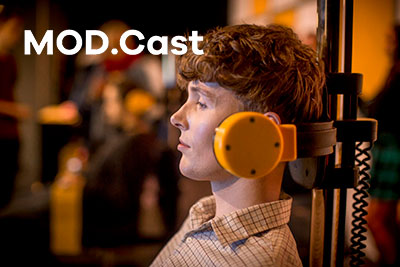
MOD.Cast season three takes a retrospective look at societal structures before lockdown and examines how we can learn from this disruption to better frame the future.
Director of MOD. at UniSA, Dr Kristin Alford, says the online exhibition and series is a testament to the role technology can play in enabling innovation in a time of crisis.
“COVID-19 has highlighted the fragility of the current systems which hold our society together,” Dr Alford says.
“Our understanding of what is ‘essential’ has changed dramatically and we’ve had to improvise new ways to work, study, travel and create as a result.
“This new season draws on the research and ideas of experts on how we can find ways to rebuild a similar but different world.
“Each new episode explores these different cultural, economic and personal challenges, including how we can maintain a healthy and positive outlook while the future still remains uncertain.”
The six-part series was produced by UniSA journalism students Elane Bartemucci, Dim Papadopoulos and Nina Phillips in partnership with Sarah Martin from Radio Adelaide Podcast Works.
The entire season is available now to stream on your favourite podcast app as MOD. transitions from online back to galleries.
MOD. will officially reopen to the public on Tuesday 18 August after a five-month hiatus. More details, including its new COVID-19 safety measures, can be found on the MOD. website.
APPOINTMENTS
UniSA’s Jill Slay announced new Professorial Chair of Cybersecurity at SmartSat CRC
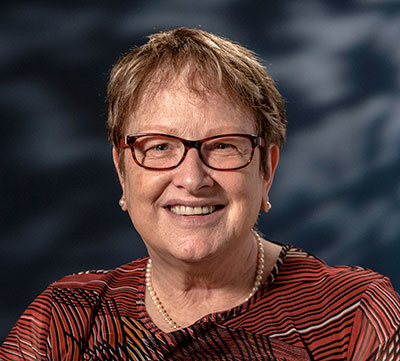
When she worked at UniSA as Dean: Research and Professor of Forensic Computing, Professor Jill Slay was on the precipice of a career revolution.
She credits the horrific destruction wreaked by terrorists on US and international citizens in the World Trade Centre and Pentagon attacks in 2001 as a career catalyst – a point of clarity – one where she could see how her research could empower governments and security forces to protect against similar tragedies.
And with the backdrop of a constantly dynamic communications and internet environment, she has brought her considerable engineering and computer science expertise to the complex issues of cyber security and resilience around the world.
Now, Prof Slay has been appointed to a new role in South Australia, one that will combine her considerable expertise in cybersecurity and cyber intelligence and forensics, with leading edge research in satellites – as a Professorial Chair with the SmartSat CRC.
One of nine new appointments supported by CRC partners, as Professorial Chair of Cybersecurity, Prof Slay will be part of Research Leadership Group drawn from around the nation, to ensure the CRC research program is at the leading edge of space system R&D.
“My focus will be on helping government and industry to build-in systems and technologies that will ensure Australian satellite systems are more secure and less vulnerable to hacking and disruption,” Prof Slay says.
“Australia has a strong dependency on satellites, and especially the new generation of Low Earth Orbit satellites, which are used for a range of purposes from defence planning and surveillance, to data and voice communications for a wide range of business and core services, weather forecasting, land surveying, and more commercial applications such as internet connectivity services and entertainment.
“At the intersection of space systems and cyber security there are vulnerabilities that have been recognised but not sufficiently addressed.
“This is not just a communications issue, satellite services can be a target for a range of cyber threats and the implications for critical functionality and national infrastructure in countries across the world are significant, from basic passive monitoring and the surveillance of satellite systems and their operational state, to actively intercepting transmitted data and or modifying data to altering the system state or position in orbit.”
Prof Slay says her role at the SmartSat CRC will be important in leading the development of a new generation of specialists in the field.
“We have an important opportunity to bring together our skills in advanced communications, engineering, computer science and cybersecurity to devise and develop technical and socio-technical solutions to the software, payload and control system vulnerabilities that put our satellites at risk,” she says.
“In partnership with industry, the Defence Science and Technology Group, CSIRO, defence primes, smaller space industry players and those with specialised instruments and systems, we’ll work to research topics such as Internet of Things security, communications security, software security, threat modelling and risk assessment – all applied to a specific satellite context.
“It’s an exciting opportunity and one that will be of enormous benefit to the burgeoning space industry sector in Australia.”
Other Stories
- 35-second body scan could tell you the sport you’re best suited to
- Insects inspire infection resistant dental implants
- Is it a bird, a plane? Not superman, but a flapping wing drone
- Could our beloved Aussie rules footy be turning into soccer?
- From the Vice Chancellor
- Achievements and Announcements
- Health students step up to the plate to help curb Australia’s $170b medical bill
- Remote internships providing students with rewarding experiences
- Video: How to keep your brain healthy
- Which is more creative, the arts or the sciences?
- Local partnership delivers world-leading ‘smarts’ to shipbuilding
- MBA student creates Australia’s most eco-friendly magazine wrap
- Pandemic prompts students to solve challenges creatively
- The latest books from UniSA researchers
- In Pictures: Open August and VC Excellence Awards online event




